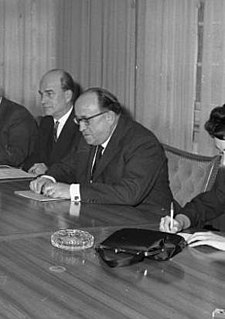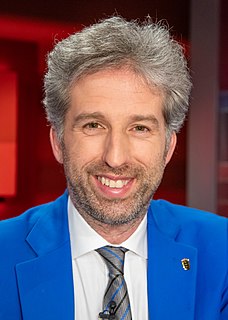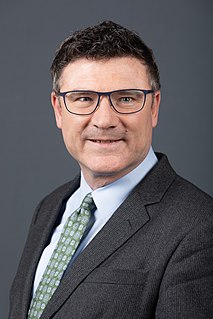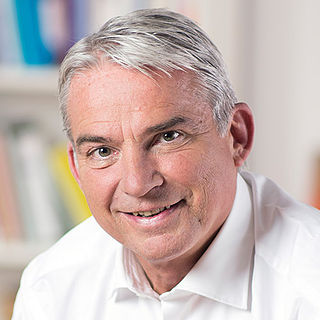
Kurt Georg Kiesinger was a German politician who served as Chancellor of Germany from 1 December 1966 to 21 October 1969. Before he became Chancellor he was a Nazi Party member, served as Minister President of Baden-Württemberg from 1958 to 1966 and as President of the Federal Council from 1962 to 1963. He was Chairman of the Christian Democratic Union from 1967 to 1971.
Helmut Schelsky, was a German sociologist, the most influential in post-World War II Germany, well into the 1970s.

Klaus Töpfer is a German politician (CDU) and environmental politics expert. From 1998 to 2006 he was executive director of the United Nations Environment Programme (UNEP).

Norbert Blüm was a German politician who served as a federal legislator from North Rhine-Westphalia, chairman of the CDU North Rhine-Westphalia (1987–1999), and Minister of Labour and Social Affairs.

Alfred Müller-Armack was a German economist and politician. He coined the term "social market economy" in 1946.
Reinhart Klemens Maurer is a philosopher and professor from Xanten, Germany.
Helmut Metzner was a plant physiologist, Professor of Biochemical Plant Physiology at University of Tübingen, the founder of the European Academy of Environmental Affairs and a co-founder of the Weikersheim Think Tank.

Boris Erasmus Palmer is a German politician and member of the Green Party. He has been mayor of Tübingen since January 2007. From March 2001 to May 2007, he was a member of the Baden-Württemberg Landtag, the State parliament in Stuttgart.

The University of Hohenheim is a campus university located in the south of Stuttgart, Germany. Founded in 1818, it is Stuttgart's oldest university. Its primary areas of specialisation had traditionally been agricultural and natural sciences. Today, however, the majority of its students are enrolled in one of the many study programs offered by the faculty of business, economics and social sciences. The faculty has regularly been ranked among the best in the country, making the University of Hohenheim one of Germany's top-tier universities in these fields. The university maintains academic alliances with a number of partner universities and is involved in numerous joint research projects.
Hans Lenk is a German rower who competed for the United Team of Germany in the 1960 Summer Olympics, and an Emeritus Professor of Philosophy. He was born in Berlin.

Stefan Kaufmann is a German politician of the Christian Democratic Union (CDU) who has been serving as a member of the German Bundestag since 2009.

Winfried Kretschmann is a German politician serving as Minister-President of Baden-Württemberg since 2011. A member of the Alliance '90/Greens, he was President of the Bundesrat and ex officio deputy to the President of Germany from 2012 to 2013. He is the first member of the Greens to serve in these offices. Identifying himself as a green conservative, Kretschmann has been associated with both culturally and economically liberal policies.
Günter Ropohl was a German philosopher of technology.

Ror Wolf was a German writer, poet, and artist who also published under the pseudonym Raoul Tranchirer. He wrote audio plays, novels, and poems and made collages.
Odo Marquard was a German philosopher. He was a professor of philosophy at the University of Giessen from 1965 to 1993. In 1984 he received the Sigmund Freud Prize for Scientific Prose.
Joachim Ritter was a German philosopher and founder of the so-called Ritter School of liberal conservatism.

Thomas Strobl is a German politician of the Christian Democratic Union (CDU) who has been serving as Deputy Minister-President of Baden-Württemberg since 2016.
Gerhard Storz was the son of a Lutheran pastor from Württemberg who at various stages distinguished himself in theatre productions, as a scholar, an educationalist, a politician and an author-journalist, sometimes pursuing one career at a time and sometimes several in combination. Throughout his adult life he liked to see himself as a "language therapist". "Human speech seems to have been encoded, sealed into formulaic structures, and pressed into service for mechanistic operations", he once wrote.

The Library of Conservatism is a specialized scientific library in Berlin. Its focus is non-fiction literature by conservative, right-wing and libertarian authors from the 18th to the early 21st century. The principal foundation for the library was laid by the writer and publicist Caspar von Schrenck-Notzing who gave his extensive private collection of books. The BdK opened in 2012 in Berlin. By 2019 its catalogued stock comprised more than 30,000 items. The library is financed and supported by the Foundation for Conservative Education and Research.
Caspar Freiherr von Schrenck-Notzing was a German writer, scholar and publisher. He was a leading thinker of the post-war political right in Germany. He is associated with the German New Right.










